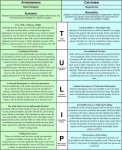[QuoteRufus said:
I take my meaning from the post-fall narrative. God did what A&E should have done. God didn't run away and hide himself from them, did he? Didn't he go and search for them? Didn't He call out to the man? Isn't that something personal beings do when we search for one another?
My point was that I don't think you are bringing to the discussion any knowledge of what is contained in the phrase "seeking God" other than a basic seek to find concept. If we were to go through all of the occurrences of seek* in the Text, do you think this is the only meaning we will find?
I will tell you that neither the Greek nor the Hebrew word translated mostly as "seek" shows up until Gen9, then only a few times in Gen, once in Ex, once in Lev and then it begins showing up more in Deut. So, though you are inserting the concept into the Garden story, it is not actually there.[/quote]
Immaterial about the Gr. or Heb word "seek" and when it shows up in scripture. I suppose when God called out to Adam, we should not interpret that as Him seeking Adam because that particular Gr. term is not in the Genesis post-fall narrative, right? Again, I use the THREE-FOLD context of ALL scripture to understand any given passage. When A&E sinned, they ran and hid from God because they DIED the moment they sinned. Is not the warp 'n' woof of spiritual death SEPARATION from our Creator who just happens to be the Author and Source of Life? Well, they both ran and hid from their Creator! Didn't they just do what came naturally to them!? Did not their behavior accurately reflect what they had become spiritually in their inner man!? DEAD! Yet, we're not supposed to talk about them not seeking after God after they sinned? Really?
Rufus said:
Are you suggesting by your second question that A&E reacted to God in the righteous manner by hiding from him? They did the right thing, did they? It wasn't necessary for them to seek after the Lord to confess their sins? To own their sins honestly before him? And to seek his forgiveness and mercy?
Is your questioning here at all serious?
My point was that they had a face-to-face relational experience with God that was seemingly beyond what anyone has had since them. There must be a reason that seeking is not mentioned until much later. The concept more akin to what you are speaking of doesn't even show up until Deut. Maybe it's used elsewhere to refer back to before this. I haven't done the work. Nor does it seem have you.
Okay you want a reason: God in his infinite wisdom said it wasn't necessary to explicitly spell out each and every detail because he gave us all reasoning powers to make reasonable and logical inferences from the three-fold context of all scripture.
Rufus said:
Even the conscience that you appealed to as being man's moral compass malfunctioned after they sinned! Yes, their conscience rightly accused them. They felt guilt and shame. But what they didn't feel. was godly remorse for their sin. Such sorrow would have moved them to confess their sin and repent of it. But they would have none of that! The deceitfulness of sin already took root in their heart so that the best they could respond to God was by playing the blame game. They thought nothing of piling on to their original sin and lying through their teeth to God when they glibly rationalized away their personal, moral culpability.
Sorry, but you're just making things up here. You don't know what they felt, nor what they knew or could understand from such an experience. All we're told is that God told them they would die. Nowhere I know of are we told that He had told them what to do if they failed Him.
I know from what I just said from above that a godly, God-fearing person would NOT have reacted as they did! David didn't. And you conveniently ignore the fact that they just piled on to their sin!
Rufus said:
Re your third point, what about numerous other texts that apply to sinners and how they are supposed to respond to God after they sin? How 'bout David's penitential psalms, for example? What are they chopped liver? Those psalms weren't written for all of us as examples to follow? If so, then I'd say those psalms, and a host of other scriptures as well, serve as the general tenor of scripture on the subject and, therefore, strongly support my argument -- and that my argument would not be one from silence at all since I use the three-fold context of all scripture to understand any given passage properly. If the progeny of Adam are required to follow certain spiritual protocols after they sin, then why wouldn't those protocols have also applied to our first parents?
Same answer. And yes you are arguing from silence if you cannot point to Scripture that informs us that A&E and anyone else you want to point to knew what God desired and required of them.[/quote]
No, it's not an argument of silence. You just got done making the point above that A&E had a stupendous, exceptional relationship and experience with their Creator so they should have deduced from that his infinite Goodness and Love for them, no? Furthermore, what if they didn't know how to respond or react to God after they sinned? So what!? Since when is Ignorance blissful? Since when is ignorance a legitimate excuse for not doing the right thing? Does the bible ever speak favorably of Ignorance? And whose fault was it that they became ignorant? Oh...should we just blame the Serpent? Eve did!
Rufus said:
When Job said Adam hid his transgression (Job 31:33), do you think Job was making a positive statement about Adam? And aren't there other scriptures that also speak to this subject in a negative or condemning way!?
Well, firstly, there is a question to whether or not Job is speaking of Adam or of man. This can be seen in some translations. The same can be seen in some translations of Genesis.
Once again, what point are you trying to make - that Adam was a God-hater and wanted nothing to do with God? Is this another all unregenerate men are TD or RTD? Are we back to TD instead of UE?
And as his wanna-be defense attorney, are you trying to say your client was a God-lover? Methinks Adam quit loving God the moment he sinned! (And by he way what is "RTD" and "UE"?) Are you going to make the case Adam loved God even though he transgressed against him and hid his transgression from him? Didn't Jesus say somewhere, "If you love me, you'll keep my commandments"? |So make your case that Adam was a God-lover. But if you can't, then this means Adam hated God -- as I have defined "hate" previously.
Rufus said:
What I do know from the Exodus account I posted in my argument, which you haven't really read but only "scanned". I do know God sent Moses on a rescue mission to rescue hundreds of thousands of Hebrews who were for the most part as idolatrous as their Egyptian captors. I do know that there is no text in the Exodus narrative itself that teaches that the Hebrews sought after God. And I do know that God, once again, sought after a bunch of sinners. God himself said he would "come down". Good enough for me to make some very logical inferences and conclusions.
Again, you're arguing from silence because seeking God is really not a topic of discussion until Deut. You're also reading past the fact that some Hebrews in Egypt had a proper fear of God. The Text uses wording in certain ways for certain reasons and we get ourselves into trouble by thinking we can just insert words and concepts because we think it's logical. The word for "seek is used once in Ex at 18:15. So, I'm not seeing any Scripture in that story itself that speaks of God seeking anyone, nor that seeking God is even a topic.
BTW, this is in part why I only scanned your Ex work and asked rather that you bring only a portion into discussion at a time. Typologies, let alone Scripture, are very easy to insert concepts into to make arguments.
Well, feel free to dismantle (if you think you can) any part of the 16-pt argument. (I did add the Song of Moses later.) I supported it well from scripture.

2
1




